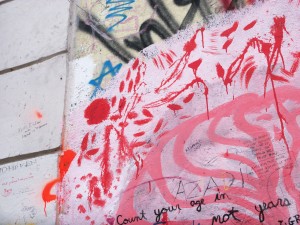
The way we communicate this story has its challenges, and both Rich and I shared the concern that by focusing on the creative pursuits of many Terezin prisoners, the horrors of the ghetto risk being downplayed. By no means do we wish to imply that the Terezin prisoners were privileged in any way. They were not able to create because conditions were better than in other ghettos, but rather they created in spite of the rampant disease, cold and starvation. Initially, people had to create their works in secret, as any artistic expression was forbidden. Gradually, over time the Nazis permitted such pursuits to an extent, primarily so they could exploit the works and build a façade of Terezin as a model ghetto. The reason that many of these works survive today is thanks to those prisoners who remained in Terezin and carefully hid away and guarded these works. Some of these works, like the cabaret, were preserved for decades before they were rediscovered.
Those of us who have committed ourselves to telling the story of Terezin have done so through the use of film, scholarly articles, traditional book publishing and blogging. We all share the desire to make this story more widely known and appreciated. Rich has been successful in promoting Making Light in Terezin, which has aired on PBS and is still aired from time to time. The documentary has also been shown at film festivals worldwide. Rich would like to continue to spread the word by finding an international distributor, and I sincerely hope he is successful in these efforts.
Theater is another way this story is told. In addition to her scholarly work, Dr. Lisa Peschel collaborates with theater departments at various universities to produce the Terezin cabaret and other dramatic works. Seeing these productions live must be an incredible experience, and I greatly hope that I can work to arrange for a production to come to Colorado. For now, I am focused on researching, developing and growing my blog as the main way to share the stories of the artists of Terezin. I feel so strongly that these stories must be passed along, and it is truly heartening to speak with others who feel the same.